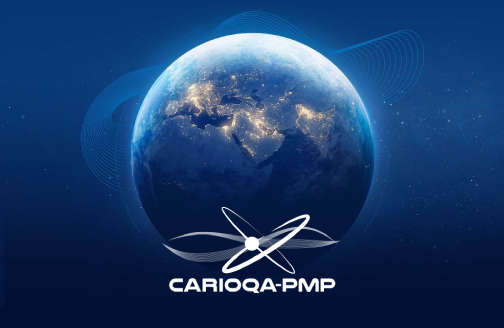- Photonics & Space
CARIOQA-PMP: Towards a space grade quantum gravimeter for Earth and Climate Monitoring
Saint-Germain en Laye (France) – 23/05/2023 – Exail will play a central role in CARIOQA-PMP (Cold Atom Rubidium Interferometer in Orbit for Quantum Accelerometry – Pathfinder Mission Preparation), a project kicked off in December 2022 under the European Commission’s Horizon Europe program. Running until March 2026 with a €17 million budget, the project aims at developing a quantum sensor for space application, relying on the spatialization of Exail’s atom cooling laser system.
The impact of climate change is one of the most severe challenges of the 21st century. It is therefore of high importance to understand the underlying processes and causalities. A powerful tool to gain this vital knowledge on a global scale is the satellite-based observation of changes in Earth’s mass distribution, for example from melting glaciers or loss of groundwater. The required high-precision measurements are reachable with novel quantum sensors. Due to the extensive European heritage and a close collaboration within the European Union an independent development and operation of a quantum sensor based space mission can be realised.
European industry in collaboration with European research institutions will build an engineering model of an accelerometer based on atom interferometry for a Quantum Space Gravimetry pathfinder mission. Benefitting from the heritage of its research institutions, this project aims to bring Europe into a leading position for sustainable quantum technologies in space.
Atom interferometry is a powerful tool for high-precision measurements of Earth’s gravitational field. It profits from the quantum properties of atoms that serve as a test mass. The quantum sensing activity of Exail started 12 years ago in the very footsteps of Alain Aspect. The company is now the world’s leader in industry-grade quantum sensors based on cooled-down rubidium atoms. Such sensors are operated worldwide by non-specialists, from the top of Mount Etna to Antarctica.
The sensitivity of atom interferometers with respect to gravity can be increased using long free-fall times that are available in space. In orbit, these devices can be used to observe global processes like a rise of the sea level with unrivaled sensitivity. However, their adaptation and qualification for space is challenging. The CARIOQA-PMP project will mature these quantum sensors and therefore prepare the ground for future high-precision gravimetry missions in space.
“Exail has already worked on the spatialization of its atom cooling laser system since 2018 in partnership with the French CNES. An engineering model of such a space grade fibered laser source for quantum interferometry will be ready (tested in space-like environment and delivered) by the end of 2023 for the CARIOQA-PMP project.” states Aurélien Eloy, laser engineer at Exail.
Thomas Lévèque, engineer at CNES and Technical Coordinator of CARIOQA-PMP Project, highlights the long partnership with Exail “CNES has followed the technological developments of Exail on quantum gravimetry and atom laser-cooling since the beginning in 2011 (when the company was still known as Muquans), supporting some of their R&D efforts with technology transfers. We know that Exail is an industrial company that masters not only the optical components but also the system approach, capable of designing and manufacturing complex quantum gravimeters that are robust enough to operate in harsh environments such as the top of Mount Etna. We have worked with Exail’s team on the space qualification of their system, especially with regards to its design. Today, the engineering model of the laser source is almost ready. It is one of the two main sub-systems on which rely the CARIOQA-PMP project.“
The laser system will include a range of state-of-the-art technologies developed and integrated in-house: micro-optical bench, frequency-stabilization module and frequency doublers with hermetic packaging and space grade optical components: TRL9 LiNbO3 phase modulators, and high-power (1 W targeted) and space Erbium Doped Fiber Amplifier (EDFA) with polarization-maintaining. Exail’s long experience in the space domain (its inertial navigation solution, Astrix Series, leverages 6 million hours in orbit without incident over 30 years) will also help in the spatialization of the control electronics. The whole system is going to fit into a very compact package, 4 times smaller than Exail’s Intelligent Laser System (ILS Series). Further environmental tests will be performed by Exail on the other sub-systems of the laser system to have them space qualified and ready for integration in the engineering model by the end of the project.
CARIOQA-PMP brings together leading players from five EU countries. These include experts in satellite instrument development (Airbus, Exail, TELETEL, LEONARDO), in quantum sensing (LUH, SYRTE, LP2N, LCAR, ONERA, FORTH), space geodesy, Earth sciences and users of gravity field data (LUH, TUM, POLIMI, DTU), as well as in impact maximisation and assessment (G.A.C. Group). The pathfinder mission preparation is coordinated by the French and German space agencies CNES and DLR under CNES lead.

| Thomas Lévèque will introduce the CARIOQA-PMP mission during the upcoming ‘2023 Space Users Conference – Photonics technologies to explore new Space Frontiers‘ organized by Exail on May 31st at Saint-Germain en Laye. Learn more. |
- Read the full Press Release on the CARIOQA-PMP website: Press release #1: Towards climate studies using quantum technologies.


